ATOMIC
Anthropology, Technology, Omega point, Music, Images, Cognitive science

10 March 2025Stanford University: click hereFebruary 26, 2023Location: Triton Museum of Art, 1505 Warburton Avenue Santa Clara, CA 95050Time: 11:00 Confirmed: Jinxia, Ani, Jessica, Piero 
A:
T:
O:
M:
I:
C:
|
September 25, 2021Location: Coyote Point Time: 3pm Confirmed: Arun, Jessica, Anirudh, Mary Anna, Enrique, Piero, Jinxia, Krishnan, Anand, Sofia, Kelley, 
A:
T:
O:
M:
I:
C:
|
April 3, 2016Location: Garin/Dry Creek Park, 1320 Garin Avenue, Hayward, CA 94544 Time: 3pm Confirmed: Monica, Sofia, Onam, Jinxia, Anand, Piero, Kelley, Rohit, Bin, Anirudh A:
T:
O:
M:
I:
C:







|
May 16, 2015Where: Garin Barn Visitor Center in Hayward Time: 3:00 pm A: Marriage [Sofia] (Europeans don't divorce as much as US couples, but they don't get married either. US couples divorce frequently, and get married much younger than any other developing country. How are ethnic groups in the USA changing these stats?)
T: Selfies, Surveillance and the Self-made Panopticon [piero]
O:
M:
I:
C: Poetry and Memory [Rohit]
|
January 18, 2015Where: The Skylawn Cemetery in Half Moon Bay Time: 3:00 pm A:
T:
O:
M:
I:
C:
|
November 16, 2014Where: The Skylawn Cemetery in Half Moon Bay Time: 1:30 pm A:
T:
O:
M:
I:
C:
|
April 5, 2014Where: The Monumental Cemetery in Colma , 1500 Mission Road Colma CA 94014A: T:
O:
M:
I:
C: |
If you live in the Bay Area and are interested in joining, email me. And, of course, tell me something about you.
The idea was born during a coastal hike. The invitation went out on January 24, 2013 to an initial group of friends, trying to have a sample of artists, technologists, humanists, cognitivists and students from different parts of the world. ATOMIC stands for (i need to live up to my reputation for ridiculously silly acronyms):
What we do:
Why: "Solvitur ambulando" ("It is solved by walking") as the wandering scholars of medieval Europe had it; or, if you prefer Eastern philosophy, "To leave is to arrive and to arrive is to leave" (Yong-Kyun Bae) Your significant others are obviously welcome, as are neighbors, coworkers, fellow hikers, etc. Feel free to suggest others. In the spirit of ethnic diversity, people born and/or raised in other countries/continents are particularly welcome to broaden our horizons. You won't have the same "voting rights" of the initial group until you have attended a few ATOMIC hikes. However, we feel that the discussion makes sense only if the group if eight people or less. We may split in two groups if we are more than eight. These are not hardcore hikes but people do need to be able to walk 5-10 kms to an inspirational point. The location of the hike is based on geographic center of mass. Topics and reading material are announced at the beginning of the month. You are supposed to check out the reading material (whether texts, films, compositions...) during the month (not only the day before the ATOMIC hike).
General rules:
|
February 22, 2014Where: Lake Chabot. Meet at lake Chabot Marina parking lot at 1pm: http://www.ebparks.org/parks/lake_chabot#trailmap. Coordinates: 37.717283,-122.104329A: Income Inequality, Greed, the Welfare State [Sofia]
T: Net Neutrality [Anand]
O: The Reality Created by our Devices [Kelley]
M: Meredith Monk's "Traveling" [Monica] I: The Changing Definition of "Film" [piero]
C: How much is intelligent behavior due to the way we structure the environment in which a human or a machine operate? [piero] |
March 10, 2013Here are the themes and suggested reading. Hike destination: Sweeney Ridge (about 1 hour up).A: What do we miss (or gain?) if we don't physically interact with other humans?
T: Biomimicry
O: If i replace all the neurons in your brain with chips that perform the exact same function, are you still you? If that brain is not you anymore, is it a person? If yes, is it ethical to perform experiments on "it"?
M: Michael Gordon's Timber for six 2x4s
I: Makoto Aida
C: The Cognitive Development of Pretty Girls


|
April 13, 2013Here are the themes and suggested reading. If you want to suggest more readings, email me and i'll post them here (in the age of Twitter, make sure it's something good but BRIEF). Hike destination: Tilden Park (about 1 hour hike).A: Youth suprematism, the idea that young people know better than old people for A (a 9-yo told our friend Emily who is his teacher "you are old" dismissing what she was trying to teach him )
T: Sexism in the High-tech Industry
O: The Morality of the Robotic Society
M: Johann-Sebastian Bach, inventor of heavy metal music I: Yayoi Kusama C: Our friend Beth told the story of a little girl who has two very talkative siblings who never let her talk, so she starts screaming "Me talking! Me talking!" as in "let me talk". It seems that the need to talk talk talk is not just of old people, it's already there at birth.

|
May 12, 2013See themes and suggested readings below. Hike destination: Pacifica (on the coast, north of Half Moon Bay)A: Technologically-created Reality T: Online Education and Disembodied Growth
O: The Morality of Immortality
M: John Cage's 4'33" I: Cenci Goepel and Jens Warnecke C: Creativity in the Wild
|
My writing



